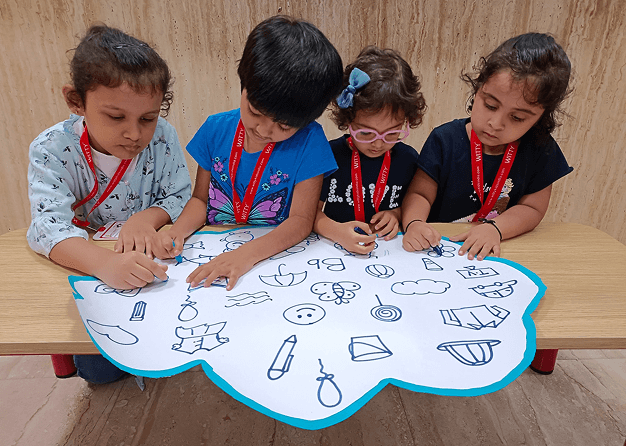Every parent dreams of their child thriving academically, but success starts with a strong foundation in the early years. These critical years shape cognitive, social, and emotional development, laying the groundwork for future learning. The good news? Helping your child succeed doesn’t have to be overwhelming. With intentional choices, like fostering a love for reading and creating a supportive learning environment, you can give them the tools to excel. Here’s a guide to help you and your child begin this rewarding journey with confidence.
Creating a Supportive Home Environment for Learning
Your child’s academic success begins at home. A supportive home environment not only boosts confidence but also helps establish lifelong learning habits. Here’s how to create a space where learning can flourish.
Set Up a Dedicated Learning Space
Designate an area in your home specifically for studying and creative activities. It doesn’t have to be fancy; a clean, quiet corner with good lighting and basic supplies like pencils, notebooks, and art materials can make a big difference. Having a consistent spot signals to your child that learning is a priority.
Establish Routines
Children thrive on consistency. Create daily routines that balance learning, play, and rest. For example:
- Set aside specific times for reading or educational games.
- Encourage a bedtime routine to ensure they get adequate sleep, which is essential for cognitive development.
Limit Screen Time
While technology can be an excellent educational tool, excessive screen time can distract from focus and growth. Set reasonable limits on screens and prioritize engaging activities that stimulate problem-solving and creativity instead.
Be a Learning Role Model
Children mimic what they see. Show an interest in learning by reading, discussing new ideas, or pursuing your hobbies. When children see adults value education, they’re more likely to adopt the same mindset.
Choosing the Right Preschool or Early Learning Program
The preschool years are a vital stepping stone in your child’s educational path. Selecting the right early learning program can significantly influence their cognitive and social development.
Explore Program Options
Whether it’s a traditional preschool or a specialized program, focus on institutions that prioritize hands-on learning, individualized attention, and strong core curricula. K-8 charter schools, such as those in Ft. Lupton, CO, offer continuity in education, which can foster deeper academic engagement and confidence as your child progresses through the grades.
Look for Qualified Educators
Ensure the program’s teachers are experienced and passionate about nurturing young learners. Early childhood educators play a pivotal role in shaping a child’s enthusiasm for school and learning.
Assess the Environment
Visit the school to get a sense of its atmosphere. Look for clean and welcoming spaces filled with engaging materials, as well as collaborative activities that encourage social and emotional growth.
Align Values
Choose a program that complements your family’s values and your child’s learning style. For instance, if creativity is vital to you, find schools that emphasize art and exploration.
Encouraging a Love for Reading and Learning at Home
One of the best ways to set your child up for lifelong academic success is by nurturing a love for reading. Reading is the foundation of all learning, and you can help make it a joyful habit.
Start Early
Introduce books to your child from a young age. Picture books with vibrant illustrations can capture their imagination, even before they fully understand the words.
Read Together Daily
Set time aside to read with your child every day. Use expressive voices and ask questions about the story to spark their curiosity and comprehension skills. For instance:
- “What do you think will happen next?”
- “Why do you think the character made that choice?”
Make Books Accessible
Create a home library with books appropriate for your child’s reading level. Rotate out books regularly to keep things fresh. Libraries and secondhand stores can be fantastic resources for building a collection on a budget.
Connect Learning With Fun
Tie reading into your child’s interests. If they love animals, choose books about wildlife. If they’re fascinated by space, explore books on planets and astronauts. Turning books into tools for joy will help them associate reading with positivity.
Developing Essential Skills Through Play and Activities
Play isn’t just fun; it’s an essential part of learning. Through play, children build critical thinking, problem-solving, and social skills that are fundamental for academic success.
Choose Educational Toys
Opt for toys that encourage creativity and learning, such as puzzles, building blocks, or science kits. These activities are excellent for improving spatial reasoning, fine motor skills, and logical thinking.
Integrate Math Through Games
Every day activities can become math lessons in disguise:
- Count items during grocery shopping.
- Play board games that involve basic addition or subtraction.
- Build towers and compare their size and height.
Encourage Creative Play
Imaginative activities like drawing, storytelling, and role-playing develop communication, empathy, and innovation. For example:
- Provide art supplies and encourage your child to “create a masterpiece.”
- Host a “pretend store” where your child practices counting and communication.
Explore the Outdoors
Outdoor play is crucial for both physical and cognitive development. Take nature walks, point out patterns in leaves, or use the opportunity to introduce scientific concepts.
Partnering With Educators for Personalized Support
Your child’s teachers are some of your greatest allies in ensuring academic success. Building strong relationships with them creates a support network for your child.
Communicate Regularly
Stay informed about classroom activities and ask about your child’s progress. Reach out to teachers if you have concerns about their performance or behavior. Open communication helps catch potential issues early.
Attend School Events
Participate in parent-teacher meetings, volunteer at school events, and attend workshops. Engaging with the school fosters mutual respect and collaboration with educators.
Seek Personalized Support
Every child learns differently. If your child struggles with a particular subject, discuss tailored solutions with their teacher. They can recommend strategies or resources to support your child’s needs.
Celebrate Efforts, Not Just Results
Work with teachers to emphasize effort over perfection. Praising hard work reinforces a growth mindset, teaching children to overcome challenges and keep learning.
Conclusion
Equipping your child for academic success begins with building a strong foundation at home and extends through meaningful partnerships with educators and schools. Creating a supportive and engaging learning environment is key, alongside choosing the right educational program to meet your child’s unique needs. Encouraging a love for reading, exploration, and curiosity further sets the stage for lifelong success and growth.






